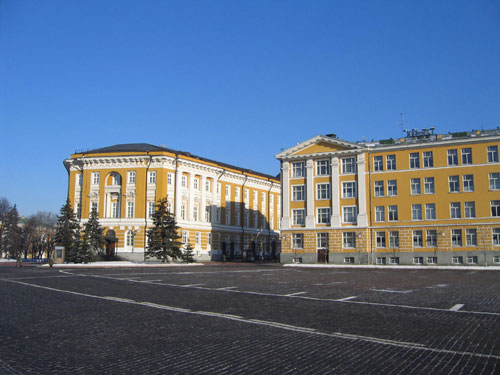Difference between revisions of "Federal Soviet"
(Removed stub status, edited alt text on image) |
(Expanded, cleaned up text) |
||
| Line 1: | Line 1: | ||
| − | [[Image:S_soviet1.jpg|frame|The Caselonian Federal Soviet in Novaya Moskva.]] | + | [[Image:S_soviet1.jpg|frame|The Caselonian Federal Soviet in [[Novaya Moskva]].]] |
| − | The ''' | + | The '''Федеративный Совет''' (tr:''Federativny Sovyet'') or Federal Soviet comprises the highest legislative body in the [[Caselonia|Caselonian Socialist Federated Republic]] and is the only governmental organ with the power to pass constitutional amendments. It also elects the '''Presidium''' of the Federal Soviet, approves justices appointed to the Supreme Court of the CSFR, and appoints the ''Procurator General'' of the CFSR, the most senior attorney in the CSFR. |
| − | The Federal Soviet is made up of a single chamber with members elected for five-year terms. The Federal Soviet is comprised of 965 delegates, one delegate for every 300,000 | + | The Federal Soviet is made up of a single chamber with members directly elected by the citizens they represent for five-year terms. The Federal Soviet is comprised of 965 delegates, ostensibly one delegate for every 300,000 Caselonian citizens. The entire Federal Soviet meets biannually but it can be called into extraordinary session by the 36-member Presidium. The Presidium of the Federal Soviet carries out the day-to-day operations of the Federal Soviet and can, if necessary, propose legislation to be passed to the [[Council_of_ministers|Council of Ministers]] without calling an assembly of the entire Federal Soviet. |
| + | |||
| + | The Federal Soviet has no veto power but is powerful enough that almost every bill it proposes passes. The Congress of Peoples' Deputies requires a 2/3rds majority to veto a bill passed by the Federal Soviet, although the Supreme Court of the CSFR can rule against acts passed by the Soviet if they are found to be unconstitutional. The President can also veto a bill proposed by the Federal Soviet if he so chooses, although this has never happened. | ||
[[Category:Caselonia]] | [[Category:Caselonia]] | ||
Latest revision as of 16:35, 26 February 2006

The Федеративный Совет (tr:Federativny Sovyet) or Federal Soviet comprises the highest legislative body in the Caselonian Socialist Federated Republic and is the only governmental organ with the power to pass constitutional amendments. It also elects the Presidium of the Federal Soviet, approves justices appointed to the Supreme Court of the CSFR, and appoints the Procurator General of the CFSR, the most senior attorney in the CSFR.
The Federal Soviet is made up of a single chamber with members directly elected by the citizens they represent for five-year terms. The Federal Soviet is comprised of 965 delegates, ostensibly one delegate for every 300,000 Caselonian citizens. The entire Federal Soviet meets biannually but it can be called into extraordinary session by the 36-member Presidium. The Presidium of the Federal Soviet carries out the day-to-day operations of the Federal Soviet and can, if necessary, propose legislation to be passed to the Council of Ministers without calling an assembly of the entire Federal Soviet.
The Federal Soviet has no veto power but is powerful enough that almost every bill it proposes passes. The Congress of Peoples' Deputies requires a 2/3rds majority to veto a bill passed by the Federal Soviet, although the Supreme Court of the CSFR can rule against acts passed by the Soviet if they are found to be unconstitutional. The President can also veto a bill proposed by the Federal Soviet if he so chooses, although this has never happened.
